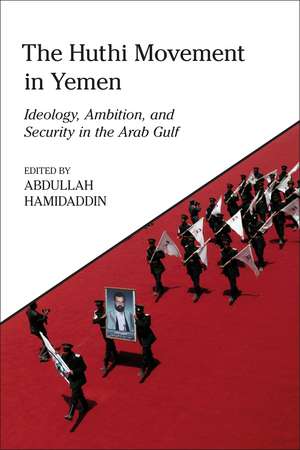The Huthi Movement in Yemen: Ideology, Ambition and Security in the Arab Gulf: King Faisal Center for Research and Islamic Studies Series
Editat de Abdullah Hamidaddinen Limba Engleză Paperback – 27 iul 2022
| Toate formatele și edițiile | Preț | Express |
|---|---|---|
| Paperback (1) | 156.28 lei 43-57 zile | +32.35 lei 6-12 zile |
| Bloomsbury Publishing – 27 iul 2022 | 156.28 lei 43-57 zile | +32.35 lei 6-12 zile |
| Hardback (1) | 439.89 lei 22-36 zile | |
| Bloomsbury Publishing – 27 iul 2022 | 439.89 lei 22-36 zile |
Preț: 156.28 lei
Preț vechi: 168.08 lei
-7% Nou
Puncte Express: 234
Preț estimativ în valută:
29.91€ • 31.11$ • 24.69£
29.91€ • 31.11$ • 24.69£
Carte tipărită la comandă
Livrare economică 14-28 aprilie
Livrare express 08-14 martie pentru 42.34 lei
Preluare comenzi: 021 569.72.76
Specificații
ISBN-13: 9780755644285
ISBN-10: 075564428X
Pagini: 312
Dimensiuni: 156 x 234 x 33 mm
Greutate: 0.5 kg
Editura: Bloomsbury Publishing
Colecția I.B.Tauris
Seria King Faisal Center for Research and Islamic Studies Series
Locul publicării:London, United Kingdom
ISBN-10: 075564428X
Pagini: 312
Dimensiuni: 156 x 234 x 33 mm
Greutate: 0.5 kg
Editura: Bloomsbury Publishing
Colecția I.B.Tauris
Seria King Faisal Center for Research and Islamic Studies Series
Locul publicării:London, United Kingdom
Caracteristici
Interdisciplinary volume with diverse topics covered ranging from radicalism, social movements, international relations, politics, socio-political identity, collective memory, media, and Islamism
Notă biografică
ABDULLAH HAMIDADDIN is a researcher on Middle Eastern societies, politics and religion with a focus on Saudi Arabia and Yemen. He is currently Senior Research Fellow, director of the Yemen Program at King Faisal Center for Research and Islamic Studies. He had previously chaired Imam Zaid bin Ali Cultural Foundation, an NGO concerned with the preservation of Yemen's manuscript heritage. His books include Tweeted Heresies: Saudi Islam in Transformation (2019), Harmonious Being (Al-Kaynuna al-Mutanaghima) published in 2012 and Zaydism (Al-Zaydiyya) published in 2010. He obtained his PhD in Social Anthropology from King's College London.
Cuprins
Introduction, Abdullah Hamidaddin, King Faisal Center for Research and Islamic Studies, Saudi Arabia I. Huthi Ideology and the Belief System 1. On the Nature of Huthi Religious and Political Authority and its Relationship to Zaydism, Bernard Haykel, Princeton University, USA 2. Transformation of Dominant Political Themes from the Founder to the Current Leader of the Huthi Movement, Mohammed Almahfali, Centre for Advanced Middle Eastern Studies, Lund University, Sweden 3. The "Soft War" and the past: The Huthi movement's use of historical narratives as source of legitimacy, Alexander Weissenburger, Austrian Academy of Sciences, Austria II. Reconfiguring Yemen's Society 4. Tribes and Rulers, 3.0 Dominance and the "Subaltern" in Huthi Yemen Marieke Brandt, Austrian Academy of Sciences, Austria 5. Women under the Huthi regime: gender, Islam and nationalism, Ewa Strzelecka, Vrije Universiteit Amsterdam, Netherlands 6. Huthi Influence on Education: An Investigation of Interventions and Policies, Shaker Lashuel, Yemeni American News, USA 7. Propaganda, Creativity, and Diplomacy: The Huthis' Adaptive Approach to Media and Public Messaging, Hannah Porter, DT Global, USA 8. The Huthi zamil: folk literature or propaganda?, Emily Sumner, University of Minnesota, USA III. Re-Engineering the State 9. State" and Coercive Power in Yemen: The Huthis and the Tribal-Sectarian Field, Anthony Chimente, Gulf State Analytics, USA 10. Huthi Visions of the State: A Huthi Republic with an Unofficial Imam, Charles Schmitz, Towson University, USA 11. Becoming the state: How Ansar Allah took over and adapted formal institutions at the local level, Joshua Rogers, Berghof Foundation, Germany IV. Regional Impact 12. Hybrid Warfare: Lessons from the Sa`udi-led Coalition's Intervention in Yemen 2015-2022?, James Spencer, British-Yemeni Society 13. The Yemeni-Saudi Border: The ?uthis and The Evolution of Hybrid Security Governance, Eleonora Ardemagni, Italian Institute for International Political Studies (ISPI), Italy 14. More than a proxy: the Huthis as a non-state actor with a foreign policy?, Maria-Louise Clausen, Danish Institute for International Studies (DIIS), Denmark
Recenzii
[The Huthi Movement in Yemen] serves as an authoritative body of work for those looking for a broad overview of who the Houthis are and why they will remain a key player in Yemen's political and cultural scene for years to come.

